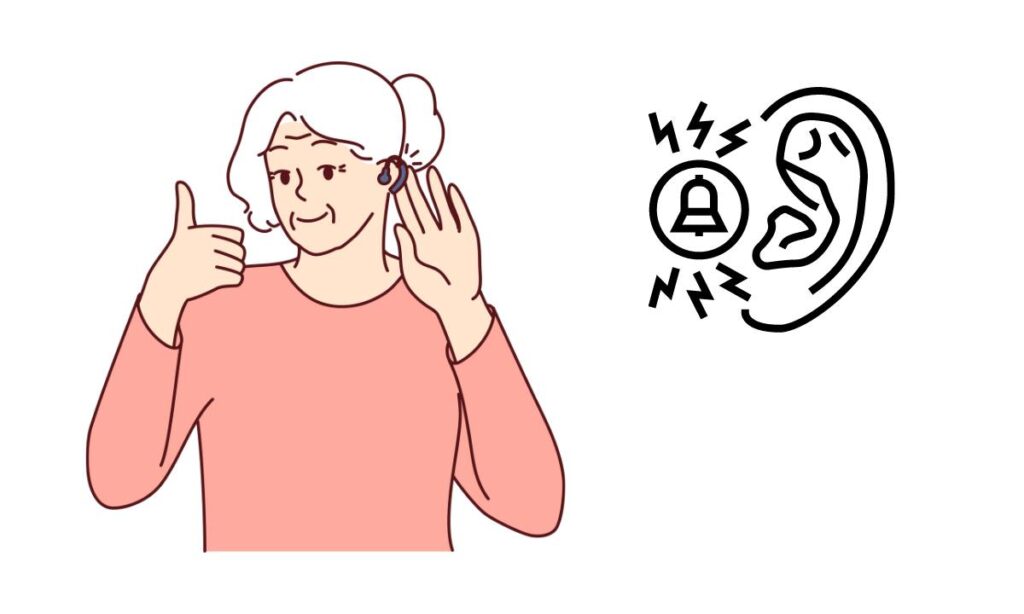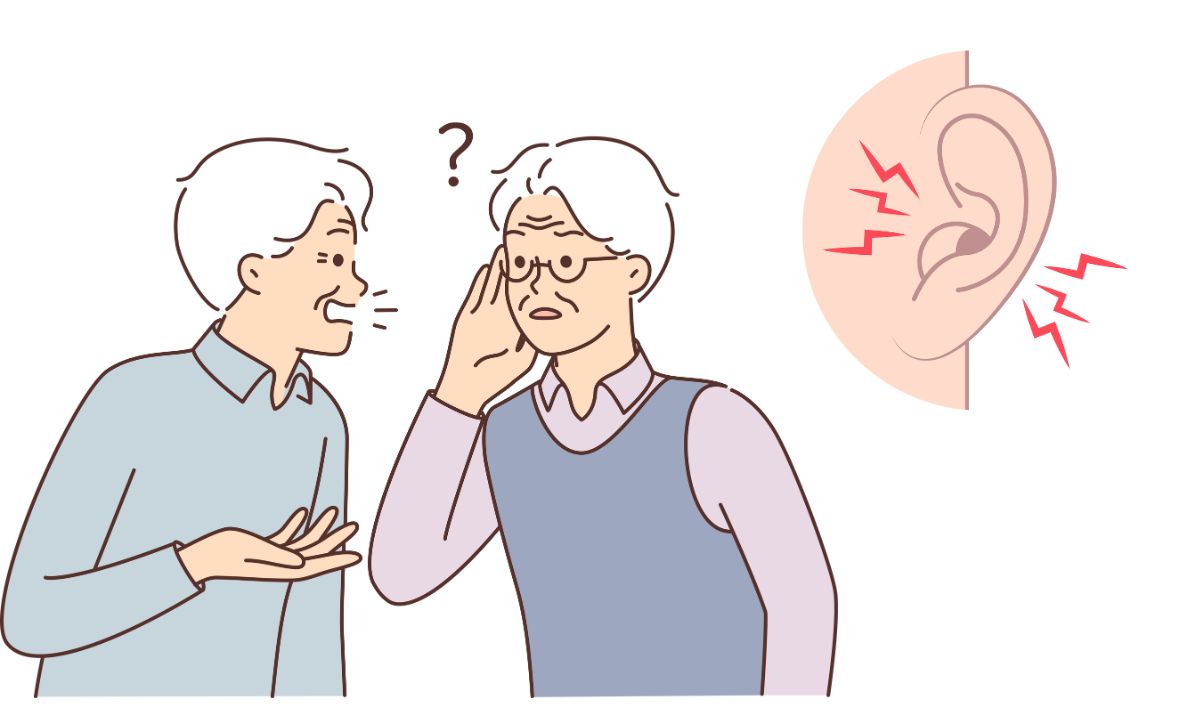Ringing in the ears, also known as tinnitus, is something many people have experienced at some point.
It’s that persistent sound in one or both ears that doesn’t seem to go away.
For most, it’s a temporary problem. However, for millions of people, tinnitus can become a long-term issue.
In fact, around 50 million Americans experience some form of tinnitus, and for about 20 million, it’s a chronic condition.
While tinnitus is not always serious, it can sometimes be linked to hearing loss. Understanding the causes and symptoms is key to managing it properly.
Types of Tinnitus
There are two main types of tinnitus:
- Non-pulsatile (subjective) and
- Pulsatile (objective).
Non-pulsatile tinnitus is the most common type. It’s a noise generated in the brain’s auditory cortex, the area responsible for processing sounds.
People with non-pulsatile tinnitus hear different kinds of sounds, like tones, static, or ringing, that may change in pitch or quality.
This type of tinnitus often happens when the brain tries to fill in sound information that’s missing, similar to how someone might feel a missing limb due to “phantom limb” sensations.
Pulsatile tinnitus is much rarer and is related to blood flow. People with pulsatile tinnitus hear a sound that matches their heartbeat or pulse.
This happens because of problems with blood vessels near the ear, such as abnormal vessels or tumors.
Unlike non-pulsatile tinnitus, which can vary in sound, pulsatile tinnitus usually has a steady rhythm that matches the person’s heartbeat.
How Tinnitus and Hearing Loss Are Linked

Many people who have hearing loss also experience tinnitus. If you lose hearing in certain frequencies, like high-pitched sounds, your tinnitus might also sound high-pitched.
People with more severe hearing loss may experience louder or more persistent tinnitus. If hearing loss is only in one ear, tinnitus may also only occur in that ear.
But this isn’t always the case. Sometimes people have hearing loss in one ear but still hear ringing in both ears. And not everyone with hearing loss gets tinnitus, just like not everyone with tinnitus has hearing loss.
There are other causes for tinnitus too, like problems with the jaw (called TMJ disorder).
Why Does Hearing Loss Lead to Tinnitus?
Even though hearing loss doesn’t directly cause tinnitus, they are often linked because of the way our brains work.
Dr. Allison King explains that tinnitus is thought to happen because of damage along the auditory pathways – the parts of the ear and brain that process sound.
When you lose some of your hearing, your brain gets less information from your ears. To make up for this lack of sound, your brain might become extra sensitive, almost like turning up the volume on a speaker.
This heightened sensitivity can make your brain produce the ringing or buzzing sounds of tinnitus.
Another reason for the connection is something called neuroplasticity. This is the brain’s ability to change how it works when something, like hearing loss, happens.
When the brain reorganizes to adjust to hearing loss, it sometimes starts to misfire, leading to tinnitus.
Hidden Hearing Loss and Tinnitus
There’s also something called “hidden hearing loss,” which is harder to detect. Normal hearing loss usually comes from damage to the hair cells in the inner ear or the auditory nerve.
But hidden hearing loss happens when the connection (or synapses) between the two is damaged.
This doesn’t always show up on regular hearing tests because you might still hear well in quiet places. However, it can lead to increased sensitivity and tinnitus because the signals aren’t being sent to the brain properly.
In short, tinnitus and hearing loss are often connected because when your ears are damaged or your hearing declines, your brain tries to compensate. This compensation can sometimes create the annoying sounds of tinnitus. While hearing loss is a common cause of tinnitus, not everyone with hearing loss experiences it, and vice versa.
Why You Might Have Tinnitus Without Hearing Loss
Let’s look at some of the reasons why you might have tinnitus without hearing loss.
Neurological Problems
Sometimes, tinnitus can be related to problems in the brain. If you’ve had a traumatic brain injury, it can lead to tinnitus, even if your hearing is fine.
Other brain-related conditions, like migraines or tumors in the brain, head, or neck, can also cause tinnitus.
The brain is connected to how we process sound, so when it gets affected by certain conditions, it can sometimes “create” sounds in your ears that aren’t really there.
Mental Health and Tinnitus
Tinnitus is also common in people with mental health issues like depression, anxiety, or stress. While doctors aren’t completely sure if mental health problems cause tinnitus, there’s a clear link between them.
Sometimes, having constant ringing in your ears can make you feel anxious or stressed, and if you already deal with those conditions, tinnitus might make them worse.
On the flip side, people who are really stressed or anxious may be more likely to notice or develop tinnitus. It’s like a cycle where both things make each other worse.
Vascular Diseases
Tinnitus can also be connected to problems with blood flow. If you hear a sound that follows the rhythm of your heartbeat, this is called pulsatile tinnitus.
This type of tinnitus might be caused by blockages in your arteries or blood vessels, which affect how the blood flows through your body. People with health conditions like high blood pressure or diabetes have a higher chance of developing tinnitus because these conditions can lead to problems with the blood vessels.
If you have pulsatile tinnitus, it’s important to let your doctor know. They might want to check your blood vessels to rule out any serious conditions, such as blocked arteries.
Temporomandibular Joint (TMJ) Disorder
The temporomandibular joint, or TMJ, is the joint that connects your lower jaw to your skull. If you have a TMJ disorder, it can cause tinnitus.
This type of tinnitus isn’t related to hearing loss, but rather to issues with the jaw joint.
Along with tinnitus, people with TMJ problems might also experience ear pain, a feeling of fullness in the ear, or popping sounds when they move their jaw.
Other Chronic Health Conditions
There are also other medical conditions that can cause tinnitus without hearing loss. Some autoimmune diseases and metabolic conditions are linked to tinnitus, but doctors often don’t know exactly why this happens.
In some cases, people may have tinnitus due to these chronic health problems, even if their hearing is normal.
Idiopathic Tinnitus: When the Cause Is Unknown
Sometimes, despite lots of testing and doctor visits, the cause of tinnitus can’t be found. This is called idiopathic tinnitus, which means the ringing in your ears happens without a clear reason.
It can be frustrating not knowing what’s causing your tinnitus, but it’s important to remember that even if the cause is unclear, there are still ways to manage the symptoms.
What Should You Do If You Have Tinnitus Without Hearing Loss?
If you’re experiencing tinnitus but don’t have hearing loss, it’s important to see a healthcare provider. They can help figure out if your tinnitus is related to any underlying conditions.
Your doctor may refer you to specialists like audiologists, neurologists, or other experts who can look into different causes, such as blood flow issues or TMJ disorders.
So,
Does Ringing In The Ears Mean Hearing Loss?
Not always. Tinnitus and hearing loss are connected, but tinnitus can happen for lots of reasons, even if your hearing is normal.
Hearing loss is one of the main reasons people get tinnitus, but it’s not the only reason. For example, imagine you’re at a loud concert for hours.
Afterward, your ears might ring because the loud sounds damaged tiny hair cells inside your ear. These cells help you hear, and if they get hurt, it can lead to hearing loss and tinnitus.
However, not everyone with tinnitus has hearing loss. Some people might have perfectly normal hearing but still hear ringing in their ears.
Here are a few examples of when tinnitus happens without hearing loss:
- Stress and Anxiety: Let’s say you’ve been really worried about something for a long time. You may start to hear a ringing in your ears because stress can sometimes trigger tinnitus, even if your ears are perfectly fine.
- Jaw Problems: If you have a jaw issue, like a problem with the joint that connects your jaw to your head (called TMJ), you might get tinnitus. Your hearing could be just fine, but your jaw issue causes the ringing.
- Health Conditions: People with conditions like high blood pressure or diabetes can experience tinnitus too. For example, someone with high blood pressure might hear a sound that matches their heartbeat. Their ears might not be damaged, but the ringing still happens.
How Hearing Loss and Tinnitus Are Connected
Hearing loss and tinnitus are often connected because they both involve the ear and the brain. If you have hearing loss, your brain receives fewer sounds than it’s used to.
To make up for the missing sounds, the brain might become more sensitive, almost like it’s turning up the volume. This extra sensitivity can create the ringing or buzzing sound of tinnitus.
For example, if someone has trouble hearing high-pitched sounds, their tinnitus might also be a high-pitched ringing. It’s like the brain is trying to fill in the gap where the missing sound should be.
Examples of Tinnitus with Hearing Loss
- Example 1: Imagine a construction worker who’s been around loud tools for years. Over time, they might start to lose some of their hearing, especially for higher-pitched sounds. At the same time, they could develop a ringing in their ears because of the damage caused by the loud noises.
- Example 2: Let’s say a musician spends hours in the studio with loud music. After a few years, they might notice their hearing isn’t as sharp as it used to be. Along with hearing loss, they might start to hear a buzzing or hissing sound in their ears.
References

